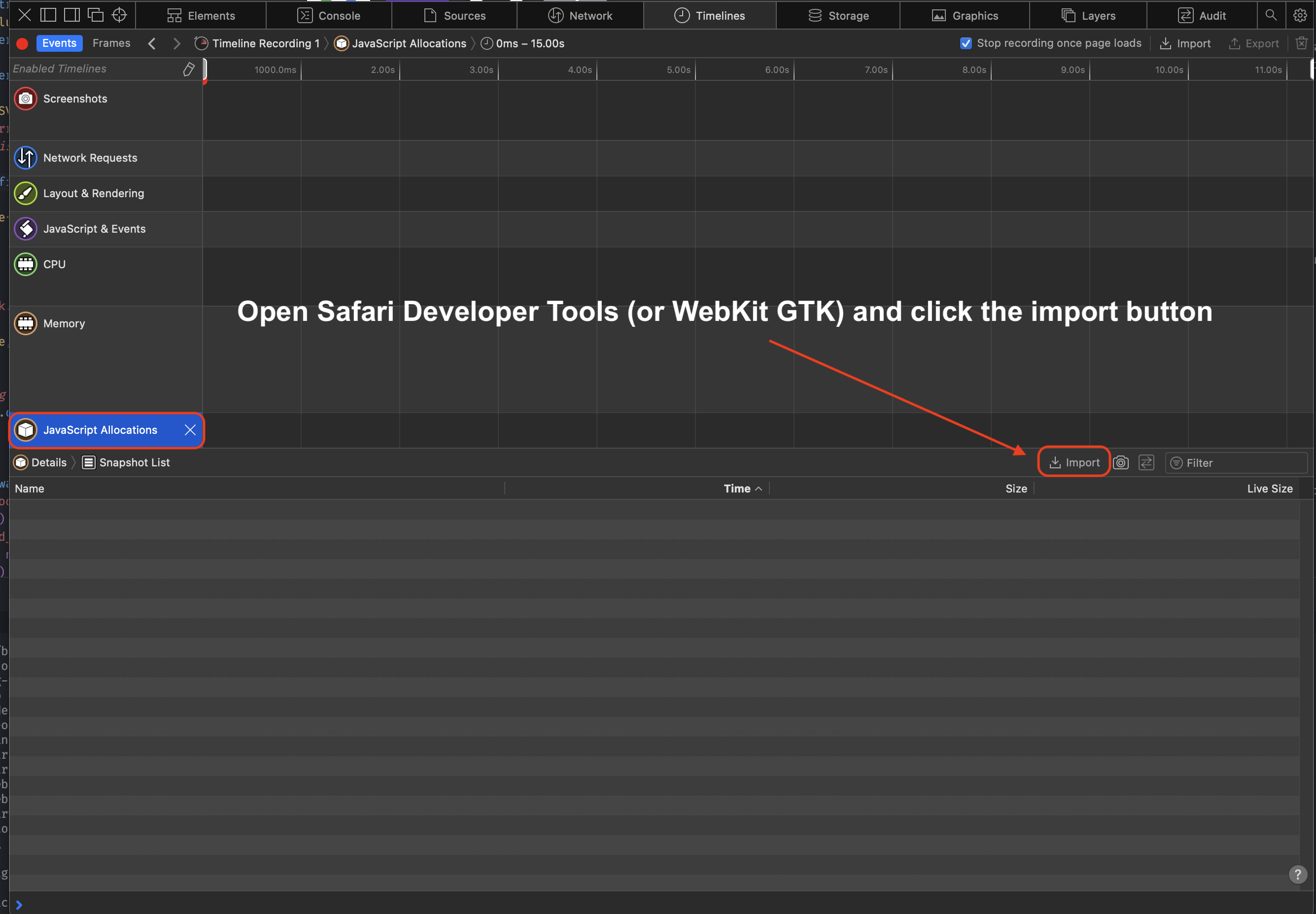diff options
Diffstat (limited to '')
| -rw-r--r-- | docs/project/profiling.md | 193 |
1 files changed, 193 insertions, 0 deletions
diff --git a/docs/project/profiling.md b/docs/project/profiling.md new file mode 100644 index 000000000..d734588b2 --- /dev/null +++ b/docs/project/profiling.md @@ -0,0 +1,193 @@ +To precisely measure time, Bun offers two runtime APIs functions: + +1. The web-standard [`performance.now()`](https://developer.mozilla.org/en-US/docs/Web/API/Performance/now) function +2. `Bun.nanoseconds()` which is similar to `performance.now()` except it returns the current time since the application started in nanoseconds. You can use `performance.timeOrigin` to convert this to a Unix timestamp. + +## Benchmarking `Bun.serve` + +You will need an HTTP client which is at least as fast as `Bun.serve()`. + +That means popular Node.js-based benchmarking tools like **autocannon is not fast enough**. + +Recommended HTTP clients: + +- [`bombardier`](https://github.com/codesenberg/bombardier) +- [`oha`](https://github.com/hatoo/oha) +- [`http_load_test`](https://github.com/uNetworking/uSockets/blob/master/examples/http_load_test.c) + +## Measuring memory usage + +Bun has two heaps. One heap is for the JavaScript runtime and the other heap is for everything else. + +### JavaScript heap stats + +The `bun:jsc` module exposes a few functions for measuring memory usage: + +```ts +import { heapStats } from "bun:jsc"; +console.log(heapStats()); + +// will show something like this: +{ + heapSize: 1657575, + heapCapacity: 2872775, + extraMemorySize: 598199, + objectCount: 13790, + protectedObjectCount: 62, + globalObjectCount: 1, + protectedGlobalObjectCount: 1, + // A count of every object type in the heap + objectTypeCounts: { + CallbackObject: 25, + FunctionExecutable: 2078, + AsyncGeneratorFunction: 2, + 'RegExp String Iterator': 1, + FunctionCodeBlock: 188, + ModuleProgramExecutable: 13, + String: 1, + UnlinkedModuleProgramCodeBlock: 13, + JSON: 1, + AsyncGenerator: 1, + Symbol: 1, + GetterSetter: 68, + ImportMeta: 10, + DOMAttributeGetterSetter: 1, + UnlinkedFunctionCodeBlock: 174, + RegExp: 52, + ModuleLoader: 1, + Intl: 1, + WeakMap: 4, + Generator: 2, + PropertyTable: 95, + 'Array Iterator': 1, + JSLexicalEnvironment: 75, + UnlinkedFunctionExecutable: 2067, + WeakSet: 1, + console: 1, + Map: 23, + SparseArrayValueMap: 14, + StructureChain: 19, + Set: 18, + 'String Iterator': 1, + FunctionRareData: 3, + JSGlobalLexicalEnvironment: 1, + Object: 481, + BigInt: 2, + StructureRareData: 55, + Array: 179, + AbortController: 2, + ModuleNamespaceObject: 11, + ShadowRealm: 1, + 'Immutable Butterfly': 103, + Primordials: 1, + 'Set Iterator': 1, + JSProxy: 1, + AsyncFromSyncIterator: 1, + ModuleRecord: 13, + FinalizationRegistry: 1, + AsyncIterator: 1, + InternalPromise: 22, + Iterator: 1, + CustomGetterSetter: 65, + Promise: 19, + WeakRef: 1, + InternalPromisePrototype: 1, + Function: 2381, + AsyncFunction: 2, + GlobalObject: 1, + ArrayBuffer: 2, + Boolean: 1, + Math: 1, + CallbackConstructor: 1, + Error: 2, + JSModuleEnvironment: 13, + WebAssembly: 1, + HashMapBucket: 300, + Callee: 3, + symbol: 37, + string: 2484, + Performance: 1, + ModuleProgramCodeBlock: 12, + JSSourceCode: 13, + JSPropertyNameEnumerator: 3, + NativeExecutable: 290, + Number: 1, + Structure: 1550, + SymbolTable: 108, + GeneratorFunction: 2, + 'Map Iterator': 1 + }, + protectedObjectTypeCounts: { + CallbackConstructor: 1, + BigInt: 1, + RegExp: 2, + GlobalObject: 1, + UnlinkedModuleProgramCodeBlock: 13, + HashMapBucket: 2, + Structure: 41, + JSPropertyNameEnumerator: 1 + } +} +``` + +JavaScript is a garbage-collected language, not reference counted. It's normal and correct for objects to not be freed immediately in all cases, though it's not normal for objects to never be freed. + +You can force garbage collection to run manually by calling: + +```js +const synchronously = true; +Bun.gc(synchronously); +``` + +### JavaScript heap snapshot + +Heap snapshots let you inspect what objects are not being freed. You can use the `bun:jsc` module to take a heap snapshot and then view it with Safari or WebKit GTK developer tools. + +{% image alt="image" src="https://user-images.githubusercontent.com/709451/204429337-b0d8935f-3509-4071-b991-217794d1fb27.png" /%} + +To generate a heap snapshot: + +```ts +import { generateHeapSnapshot } from "bun"; + +const snapshot = generateHeapSnapshot(); +await Bun.write("heap.json", JSON.stringify(snapshot, null, 2)); +``` + +To view the snapshot, open the `heap.json` file in Safari's Developer Tools (or WebKit GTK) + +1. Open the Developer Tools +2. Click "Timeline" +3. Click "JavaScript Allocations" in the menu on the left. It might not be visible until you click the pencil icon to show all the timelines +4. Click "Import" and select your heap snapshot JSON + + + +### Native heap stats + +Bun uses mimalloc for the other heap. To report a summary of non-JavaScript memory usage, set the `MIMALLOC_SHOW_STATS=1` environment variable. and stats will print on exit. + +```js +MIMALLOC_SHOW_STATS=1 bun script.js + +# will show something like this: +heap stats: peak total freed current unit count + reserved: 64.0 MiB 64.0 MiB 0 64.0 MiB not all freed! + committed: 64.0 MiB 64.0 MiB 0 64.0 MiB not all freed! + reset: 0 0 0 0 ok + touched: 128.5 KiB 128.5 KiB 5.4 MiB -5.3 MiB ok + segments: 1 1 0 1 not all freed! +-abandoned: 0 0 0 0 ok + -cached: 0 0 0 0 ok + pages: 0 0 53 -53 ok +-abandoned: 0 0 0 0 ok + -extended: 0 + -noretire: 0 + mmaps: 0 + commits: 0 + threads: 0 0 0 0 ok + searches: 0.0 avg +numa nodes: 1 + elapsed: 0.068 s + process: user: 0.061 s, system: 0.014 s, faults: 0, rss: 57.4 MiB, commit: 64.0 MiB +``` |
